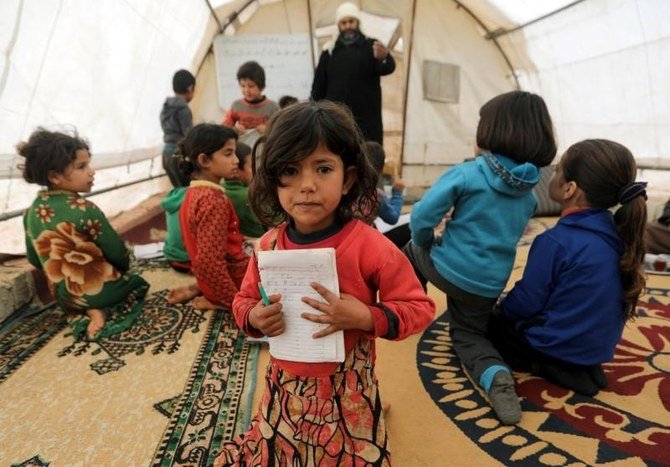
- ARAB NEWS
- 11 Jul 2025

Arab News
LONDON: The British government has committed to supporting education in conflict zones — such as war-torn Syria — with a £15.8 million ($21.9 million) funding package.
UK Foreign Secretary Dominic Raab said funding would support some of the “world’s most vulnerable children” as they hope for a brighter future.
The commitment comes amid a fierce debate between the government, Conservative rebels and aid agencies over Downing Street’s decision to cut the overall aid budget from 0.7 percent to 0.5 percent of national income.
The Syrian Education Programme, supported by UK aid and operating in rebel-held northwest Syria — which is enduring punishing attacks from President Bashar Assad’s regime — has worked to retain childrens’ education by paying teachers’ salaries and providing mental healthcare for delicate psychological needs.
Worries have grown that, after a decade of conflict, the children have missed out on basic development, with more knowledge of war than normal life.
A project worker said: “The other day I was discussing a reading activity for children and we had the word for ‘shopping mall’ — and the children did not know what that meant.”
But they added that while the children lacked knowledge of normal life, they could easily identify fighter jets and bombers from their sounds.
Conflict and violence is shaping their upbringing, and “that’s not how children should be raised,” the worker told the BBC, remaining anonymous for security reasons.
“They need to know what’s happening outside. They have lost a lot, but believe me, when you speak to the teachers, they have high expectations.
“They think education is the window to the world.”
Education has continued despite the desperate situation, with the coronavirus disease (COVID-19) pandemic and warfare creating a constant supply of suffering for the children. They have fought on to be able to take exams, according to reports seen by the BBC.
Not all teachers in northwest Syria are paid, with many volunteering their time. The project worker said his teaching was “an act of defiance, an act of faith.”
But despite this resilience and generosity, the worker said funds were still needed to ensure schools remained open and children kept their precious access to education.
Helen Grant, the British prime minister’s special envoy for girls’ education, said the resilience of children in Syria and their access to schooling had given them “hope and skills, protection, confidence and self-esteem.”
“When they get to school they’ve often been traumatised because of the bombings,” said Grant, adding that even though the schools are often makeshift tents, they still provide a lifeline for confidence and personal development.
Grant said that furthering childrens’ education was an opportunity to break the “cycles of poverty” that were becoming common in the desperately violent part of the country. She said that young girls were at an additional risk of losing an education in conflict zones.
“Schools are very much providing hope and a sense of optimism and a future — and that is desperately, desperately needed,” said Grant.
The government said the multimillion-pound fund will promote education in places with significant disruptions, such as systematic violence or areas where refugees are being displaced.
The British funds will go to projects in Syria, refugee-laden Jordan, Lebanon — where an economic crisis is causing pandemonium — and other countries.
“Children living in conflicts and protracted, long-term crisis settings are without any doubt some of the most vulnerable in the world,” said Grant.